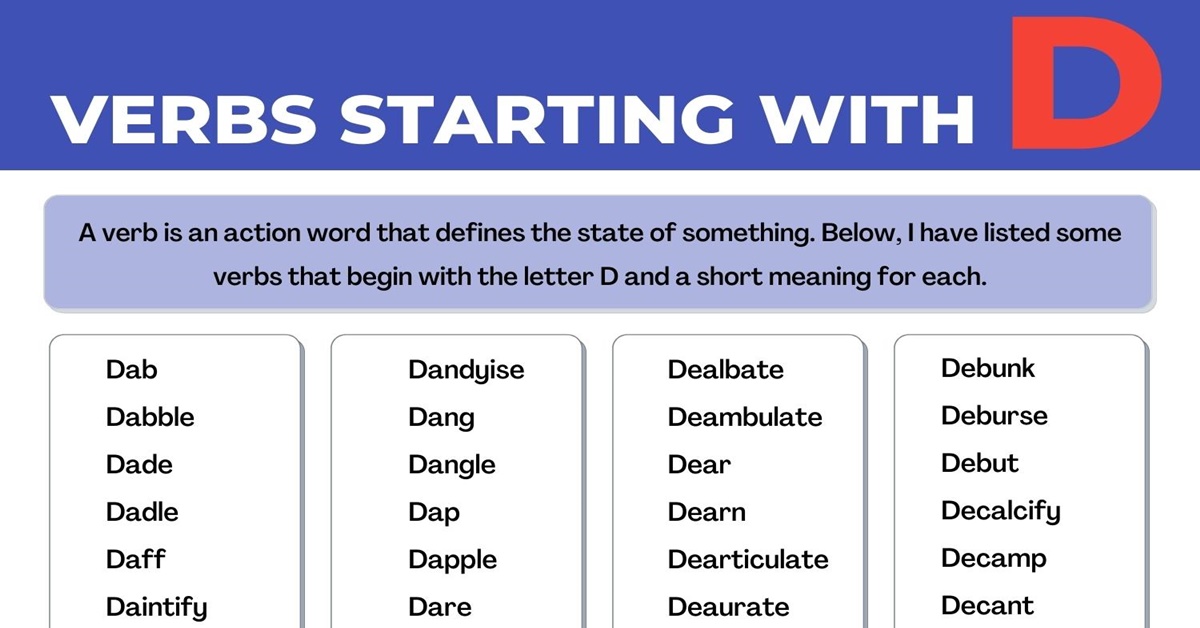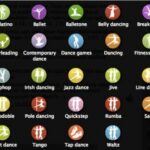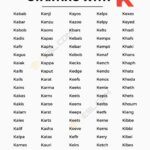Verbs That Start With D
1. Dance
2. Dare
3. Decide
4. Dedicate
5. Defend
6. Define
7. Delight
8. Deliver
9. Demand
10. Demonstrate
11. Deny
12. Depart
13. Depend
14. Describe
15. Design
16. Destroy
17. Develop
18. Discard
19. Discover
20. Discuss
21. Dive
22. Divert
23. Divulge
24. Do
25. Donate
26. Dream
27. Drink
28. Drive
29. Drop
30. Dry
More About
Welcome to today’s blog post, where we will delve into the fascinating world of verbs that start with the letter “D.” Whether you are a language enthusiast, a student, or simply someone looking to expand their vocabulary, this comprehensive exploration will provide you with an exciting array of D-verbs to incorporate into your everyday speech.
Verbs are a vital part of our language they are action words that allow us to express movement, emotions, and various states of being. They bring life and energy to our sentences, enabling us to communicate effectively and vividly. Within the vast realm of verbs, those beginning with the letter “D” offer a unique opportunity to add depth and diversity to our language.
Our journey through this linguistic landscape will cover a wide range of verbs, ensuring there is something for everyone to enjoy. Whether you are a fan of action-packed verbs or prefer the more nuanced emotional expressions, you will find something here to expand your linguistic repertoire.
Dazzle your audience by incorporating dynamic verbs like “dive,” “dance,” or “dash” into your storytelling. These verbs evoke a sense of movement and excitement, painting vivid pictures in the minds of your listeners. Imagine how the words “She dove gracefully into the clear blue ocean” or “He danced like nobody was watching” can transport your audience to a world filled with adventure and joy.
On the other hand, delve into the realm of emotional depths with verbs such as “desire,” “delight,” or “decipher.” These verbs allow you to explore the complexities of the human experience, conveying desires, joys, and the quest for understanding. By using verbs that start with “D,” you can infuse your writing with a sense of introspection and emotional resonance.
Furthermore, don’t overlook the pragmatic power that verbs beginning with “D” possess. Verbs like “determine,” “develop,” or “drive” signify action and initiative, making them indispensable tools in professional settings or personal development. These verbs embody the perseverance and determination needed to achieve goals and navigate life’s challenges.
In addition to their expressive qualities, D-verbs also offer a trove of unique and intellectually stimulating vocabulary. Uncover verbs like “discombobulate,” “disseminate,” or “disentangle” in your quest for captivating and inventive language. Spicing up your writing with these lesser-known verbs will not only impress your readers but also expand your linguistic horizons.
As we embark on this exploration of verbs that start with “D,” remember that language is a living entity constantly evolving and adapting. New words and usage emerge, infusing our lexicon with fresh perspectives and experiences. Embracing these new words can enhance our communication and make it more authentic and relevant.
So, seize the opportunity to dive into the world of “D” verbs and discover the beauty and diversity they offer. Strengthen your writing, expand your vocabulary, and excite your readers with the power and versatility of these verbs. By incorporating vibrant and expressive “D” verbs into your language, you can bring your writing to life and leave a lasting impact on your audience.
Join me in this exploration of verbs that start with “D,” and let us embark on a linguistic journey filled with creativity, emotion, and intellectual stimulation. Open your minds to the possibilities that these verbs present, and may they empower you to communicate with greater precision, imagination, and impact. Stay tuned for our upcoming posts, where we’ll delve deeper into the fascinating world of verbs starting with “D.”
FAQs:
1. Q: What does the verb “dance” mean?
A: The verb “dance” refers to the rhythmic movement of one’s body, usually to music.
2. Q: How can I improve my writing skills?
A: There are several ways to enhance your writing skills, such as reading regularly, practicing writing exercises, and seeking feedback from others.
3. Q: What does the verb “decide” imply?
A: When you “decide” something, you make a choice or reach a conclusion after considering options or information.
4. Q: How do I develop good study habits?
A: Creating a study schedule, eliminating distractions, taking notes, and breaking down tasks into manageable chunks can help in developing good study habits.
5. Q: What is the meaning of the verb “deliver”?
A: “Deliver” typically means to transport or bring something to a destination or recipient, often implying a sense of responsibility or duty.
6. Q: What are some effective ways to manage stress?
A: Engaging in regular exercise, practicing relaxation techniques, maintaining a balanced diet, and seeking social support are all effective strategies to manage stress.
7. Q: How can I become more organized?
A: Some ways to improve organization skills include creating to-do lists, utilizing calendars or planners, decluttering regularly, and assigning designated spaces for different belongings.
8. Q: What does the verb “doubt” signify?
A: “Doubt” refers to a state of uncertainty or skepticism about something, often accompanied by questioning or hesitation.
9. Q: How can I enhance my communication skills?
A: Improving communication skills can be achieved by actively listening, practicing empathy, refining body language, and seeking opportunities for public speaking or presentations.
10. Q: What is the meaning of the verb “deviate”?
A: “Deviate” means to depart or diverge from a given path, plan, or norm, often implying a deviation from an expected or conventional course.















